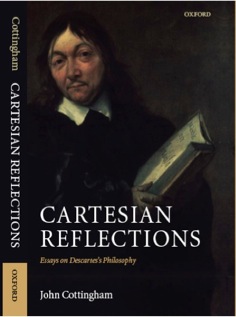Cartesian Reflections
by John Cottingham
A collection of essays on Descartes’s philosophy
Oxford University Press, 2008
“Cottingham’s essays succeed in showing even untutored readers a thinker who is much more subtle, interesting, and compelling than is often appreciated – a thinker, moreover, whose deep religious commitments played a role in his philosophy more central than either secularists or the traditional religious establishment have often been willing to admit. A must read for those with an interest in early modern philosophy, they are highly recommended for those who work or teach in other areas such as philosophy of mind.”
William Jaworski, Review of Metaphysics
“The topics covered by Cottingham extend very widely and offer nuanced and often instructive reflections both on controversial Cartesian views that still challenge his commentators, and on their simplified canonical images that continue to haunt contemporary discussions. They range from Descartes's scientific agenda to his treatment of specific problems like the nature of thought, animal consciousness, color, language, will, belief and reason, theology and ethics. Taken together, they offer a stimulating picture both of Descartes's influential and often controversial views and of Cottingham's long-standing engagement with them.”
Lilli Alanen (Uppsala University), Notre Dame Philosophical Reviews
“Cartesian Reflections … a collection of Cottingham’s highly influential articles spanning the last thirty years … serves to remind us of the debt owed to John Cottingham for being at the forefront of [the] progression to a more synoptic and thus more historically and philosophically accurate reading of Descartes … Cottingham urges us to recognise the sympathy between philosophical analysis and individual self-discovery which lies at the core of Cartesian philosophy, and to see it as a good thing the restoration of which would reduce the compartmentalising of philosophical activity from
the life well lived.”
Deborah J. Brown, University of Queensland
“It is one of the virtues of Cottingham’s admirable work that he can give us insight into a surprisingly overlooked way in which Descartes has set the agenda for all subsequent philosophy.”
Michael Della Rocca, Metascience
‘These clear and distinguished reflections will be essential for scholars and useful for students of any branch of philosophy that interested Descartes.’
Geoffrey Gorham, Philosophy in Review
CONTENTS
Part One: Overview
1. Descartes, the Synoptic Philosopher
Part Two: Descartes’s position in philosophy
2. The Cartesian Legacy
3. A New Start? Cartesian Metaphysics and the Emergence
of Modern Philosophy
Part Three: Mind and World
4. Descartes on Thought
5. ‘The only sure sign . . .’ Descartes on Thought and Language
6. Intentionality or Phenomenology? Descartes and the
Objects of Thought
7. Descartes on Colour
8. A Brute to the Brutes? Descartes’s Treatment of Animals
9. Cartesian Trialism
Part Four: Ethics and Religion
10. The Intellect, the Will and the Passions: Spinoza’s Critique of Descartes
11. Descartes and the Voluntariness of Belief
12. Cartesian Ethics: Reason and the Passions
13. The role of God in Descartes’s Philosophy
14. Descartes as Sage: Spiritual Askesis in Cartesian Philosophy
15. Plato’s Sun and Descartes’s Stove: Contemplation and Control in Cartesian Philosophy
Bibliography
Index
xiii+332pp
ISBN 978-0-19-922697-9 (hb)
Also available as Ebook
These essays cover central areas of Descartes’s rich and wide-ranging philosophical system, including his account of thought and language, of freedom and action, of our relationship to the animal domain, and of human morality and the conduct of life. They also explore ways in which his philosophy has been misunderstood. The Cartesian mind-body dualism that is so often attacked is only a part of Descartes’s account of what it is to be a thinking, sentient, human creature, and the way he makes the division between the mental and the physical is considerably more subtle, and philosophically more appealing, than is generally assumed. Although Descartes is often considered to be one of the heralds of our modern secular world-view, the ‘new’ philosophy which he launched retains many links with the ideas of his predecessors, not least in the all-pervasive role it assigns to God (something that is ignored or downplayed by many modern readers). The character of the Cartesian outlook is multifaceted, sometimes anticipating Enlightenment ideas of human autonomy and independent scientific inquiry, but also sometimes harmonizing with more traditional notions of human nature as created to find fulfilment in harmony with its creator.


